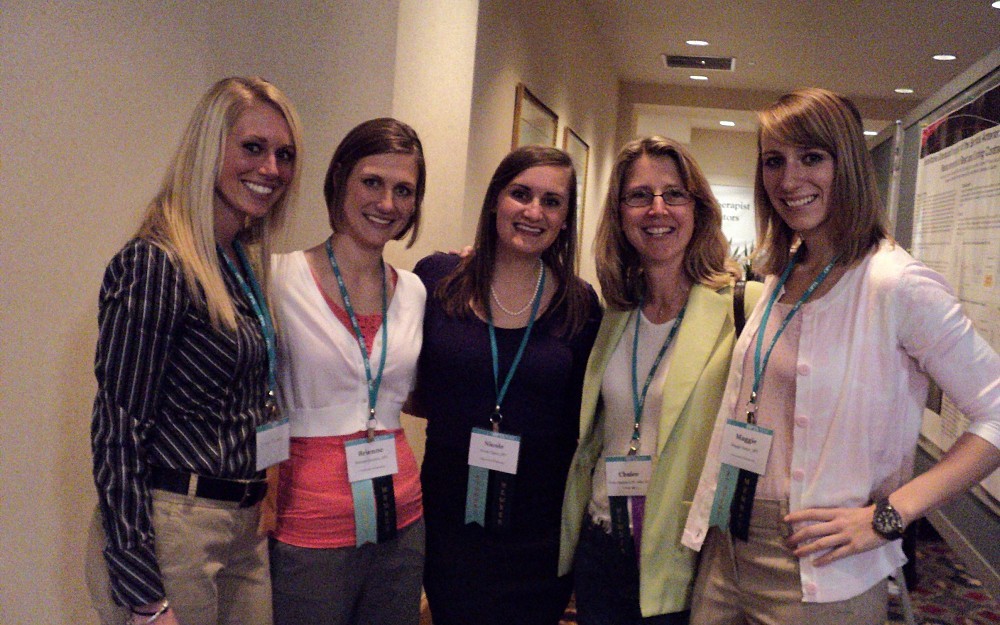
Focus on Education With Chalee Engelhard
Focus On highlights faculty, staff, students and researchers at the UC Academic Health Center. To suggest someone to be featured, please email uchealthnews@uc.edu.
Chalee Engelhard is assistant professor of rehabilitation sciences at the College of Allied Health Sciences. She also directs the department's Clinical Education program.
What brought you to UC?
"I graduated from the University of Kentucky (UK) in 1990 with a degree in health science which at UK is their physical therapy degree. I practiced in Texas for about seven years in nursing homes home health, and I had my own practice for some time. During that time, I also earned my Geriatric Specialist certification through the American Board of Physical Therapy Specialties.
"I moved back to Northern Kentucky in 1997, where I worked in the rehab setting and obtained my MBA from Thomas More College. This enabled me to take a position as a regional director of operations in Ohio where I supported physical, occupational and speech therapists in about 40 nursing facilities. I loved working with the geriatric communitytheyre fabulous.
"Then, I finally decided to answer the calling to teach. Im glad Ive had my clinical experience first, but I knew for some time that what I really wanted to do was teach. So I came to UC in 2006, into this position as director of clinical education, which I love. I have so much fun working with the students and it gets me right back into the clinic, just from a different viewpoint.
What is the focus of your research?
"The focus of my research is our clinical instructors (CIs), the volunteer physical therapists who mentor the students in their clinic work. The hope is that, the more educated the CIs are, the better the student outcomes will be in clinic. But as far as evidence connecting those dotstheres very little.
"Im developing online learning modules for CIs, to find out how we can best educate them to get stronger student outcomes. Is it just in time education, where we educate them right before they have a student in clinic, or do we give them a course at one point in time and then they implement it one to two months later?
What kind of educational issues are you working on in these modules?
"Were really focusing on professional issues right nowfor example, how to help students with their commitment to learning, communication skills and stress management in clinic.
"These types of subjective issues are much harder for CIs to address with students. The contingency plan is to usually to call the director of clinical education at the university, but if we can help lay a proactive groundwork for this, instructors will be able to recognize issues coming up and hopefully address them before they escalate.
Where does your research stand now?
"Weve just completed our pilot study on the first learning module. We had a very successful outcome and Im very excited about it. The clinicians who participated found the learning modules to be extremely helpful; several of them are implementing it as part of their own orientation process for new CIs.
"Next, well launch a full study involving our students and CIs to assess whether the CI can maintain the best practices during the clinical rotation.
"Id like to see us complete at least three of these modules, covering the basic aspects of what is seen in the literature as well as what Ive seen in my clinical experience. The goal is to conduct a follow-up study to see if the CIs who have gone through these evidence-based modules are able to significantly improve student outcomes.
When youre not working, what do you do for fun?
"I run/walk, volunteer and spend time with my family. Depending upon which sport my children are involved in at the time dictates which ball goes with us to the park.
Related Stories
Yahoo News: Doctors see rising rates of colon cancer in younger...
May 1, 2024
Yahoo News featured comments from the University of Cincinnati's Rekha Chaudhary in a story about rising rates of diagnoses and deaths from colorectal cancers among young people.
Neuroimaging, AI help detect brain changes
May 1, 2024
Researchers at the University of Cincinnati and Dell Medical School at the University of Texas at Austin are leading a study using state-of-the-art neuroimaging techniques and artificial intelligence to identify changes in the brains among children of adults living with bipolar disorder.
From flight nurse aspirations to health care innovation: Meet...
April 30, 2024
We can thank flight nurses to Bachelor of Science in Nursing, Class of ’97 alumnus Nick Dobrzelecki’s interest in nursing. More than 30 years since making that decision, Dobrzelecki has not yet flown as a nurse, but has impacted the health care industry on many fronts.
